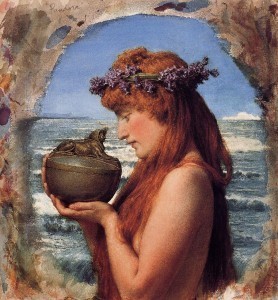Breaking the Seal on Pandora’s Jar
“I don’t read biological thrillers,” a friend told me recently, “because I don’t want to confront the ugly reality that we’re surrounded by unspeakable danger.”
I laughed aloud, surprised that Tom had been so honest about his fear. Nevertheless, he expressed a concern that I hear from at least one reader every day. “Surely it’s not that dangerous,” others insist, desperate to avoid confronting the unsettling facts about what biotechnology has thrust upon us.
We live in an unstable future. It’s time to acknowledge that reality and embrace a slippery footing on this rapidly moving boat that we call medical technology. Or, using another metaphor, it’s time to admit that we’ve slipped the seal off Pandora’s jar and begun to drink of unexpected evils that we’ve released on the world.
It was not a box. Pandora of mythology was given a jar—not a box—along with a stern warning that she was not to open the vessel under any circumstances. Curious about the gift and not dissuaded by the warnings, she slipped the lid off for just a moment . . . and unspeakable evils escaped to plague mankind. In a flash, she jammed the lid back on, sealing Hope inside. There’s a metaphor for you—a world filled with evil, and Hope of all things, sealed up where we can’t get at it.
Tom, my good friend who disavows biological thrillers, understands what he’s up against. I admire him for that. He’d have wisely left the cap on the jar if he found it at Pandora’s house. But what about the rest of us, those who don’t realize that the developments that look so promising in medicine might have some unexpected—and undesired—consequences? Technology is providing us amazing abilities to extend life, to cure disease, to improve human performance, and to overcome human frailties of all kinds. Why would anyone object to that?
Read along with me in the coming months, and we’ll unpack that question in myriad ways. Indeed, why object to advances in medicine and technology? I’ll approach this subject, in my weekly bioethics blog One More Step, exploring the core question “Just because we can . . . should we?” Just because we can grow organs and body parts in animals, is it a good idea? I have a cow’s ligament in my thigh, friends have pig heart valves in their chest, and a neighbor’s daughter depends on insulin grown by bacteria. But have we gone too far when we’re capable of growing human ovaries and human testes in mice? What happens if those mice mate?
If I could sell you a pill that would guarantee you’d make a 36 on the ACT or ace the MCAT exam for medical school, would you pay me a hundred thousand dollars for that pill? Would it be fair to those students who could not afford the magic tablet? Or, if you’re near death waiting on an organ, what’s a kidney worth? Is it wrong to sell your eggs if you’re a young woman desperate for cash? It’s your body, after all.
 First female DNA sequence. From www.sciencedaily.com
First female DNA sequence. From www.sciencedaily.comIt’s an inconvenient truth, to paraphrase a recent movie, that we’re immersed in a world of remarkable technological achievement that pounds like a jackhammer, chipping away at the foundation of ethics built on millennia of wisdom and faith. Despite the amazing good of many biotechnology and medical breakthroughs, actions have unintended consequences. In my weekly bioethics blog I’ll explore both sides of questions about technology and their unanticipated penalties. “Just because we can . . . should we?”
That’s the question that keeps me awake at night, inventing new book plots . . . and it might just be why my friend Tom stays away from biological thrillers.
The post Breaking the Seal on Pandora’s Jar appeared first on Austin Boyd.




